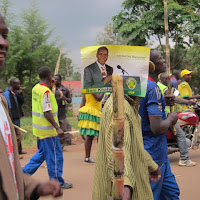It’s election year in Kenya.
Politics is all everyone is talking about. Yesterday, we got caught in a campaign
rally. The candidate is known as “The
Bullfighter” because he organizes the local bullfights. In reality, all of people are being paid
a very small amount to participate and rouse the rest of the electorate.
Since independence in 1963, there have only been 3
democratic elections, including this year.
Prior to 2002, there were two presidents “for life”….
In the 2007 election, the incumbent guy, Kibaki, announced
early in the day that he had won. It
caused major riots in the Western part of Kenya that supposedly was financed by
the party that lost. Before the country
started holding elections, there wasn’t any conflict between any of Kenya’s 42
tribes. But now the politicians are
really exploiting the tribalism which causes unrest no matter who is elected.
 To make things even more complicated, the presidential and
vice presidential candidates from one party are accused of organizing and
perpetrating the violence following the 2007 election that resulted in about
1000 people dying. They have been
formally charged and are supposed to appear before the International Court in The
Hague sometime before the election in March.
But they keep trying to get the trial date moved until after the
election, I guess in some sort of move to gain diplomatic immunity?
To make things even more complicated, the presidential and
vice presidential candidates from one party are accused of organizing and
perpetrating the violence following the 2007 election that resulted in about
1000 people dying. They have been
formally charged and are supposed to appear before the International Court in The
Hague sometime before the election in March.
But they keep trying to get the trial date moved until after the
election, I guess in some sort of move to gain diplomatic immunity?
It can be both interesting and risky to read and hear about
all the machinations of Kenyan politics, everyone has an opinion. The other day, I was sitting in the back of a
taxi going down a very bad dirt road in the rain and the driver was carrying on
a heated political discussion. His
remarks were punctuation by lots of gesturing as he was swerved left and right
to miss potholes, kids, bikes, motorcycles and goats.
Now that I think about it, Kenyan politics isn’t all that
much different than home……









